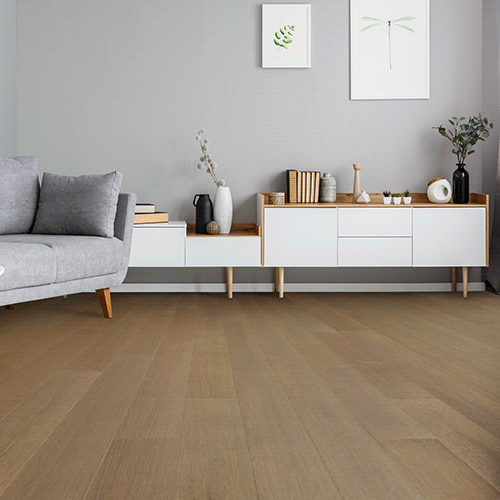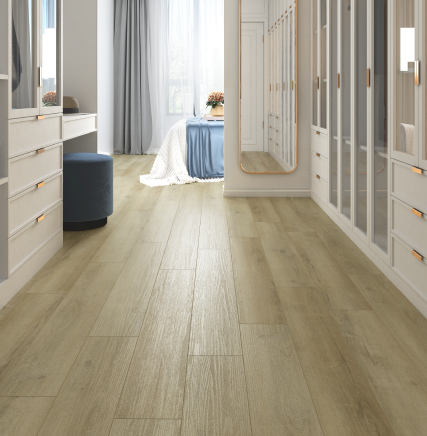Understanding the Types of Hardwood Flooring
Empire is proud to offer a wide selection of both solid and engineered wood floor products. As the name implies, Empire’s hardwood floors are made from pieces of solid wood, either in part or entirely. Solid hardwood flooring planks are hewn from lumber in a single piece; from end to end and top to bottom, a hardwood floor plank is a single unadulterated piece of solid wood. In comparison, engineered hardwood planks use a thin veneer of real wood over a core of either plywood or a high-density fiberboard. Both types of wood flooring give you the unique character of natural wood grain in a way that laminate and vinyl flooring options cannot. Because the surface of engineered and solid hardwood floors is natural wood, every plank will have a one-of-a-kind grain pattern. Both solid and engineered hardwood floors from Empire Today come finished in a variety of classic stain colors and coated with a scratch-resistant topcoat. Both types of hardwood floors can be refinished in the future.
Deciding Between Engineered and Solid Hardwood Flooring
If you’ve settled on real wood flooring, you’ve probably spent some time trying to decide whether solid hardwood or engineered hardwood floors are better. As with most decisions, there are pros and cons to each wood floor type. The most significant downside to hardwood floors is that they will cost more in materials—oftentimes it will be a significantly higher price. But because they are solid wood through and through, they can be sanded and refinished multiple times over their lifespan. With proper care, hardwood floors can look great for a hundred years. Refinishing solid hardwood flooring is a great alternative to installing completely new floors during a renovation. Solid hardwood floors are also considered among the most luxurious floor types you can install in a home and will almost always increase its resale value.
Engineered hardwood floors aim to strike the perfect compromise between real hardwood flooring and a laminate. Since the very top layer—known as the wear layer—is made of real wood and finished like a solid hardwood material, engineered hardwood floors can be refinished a limited amount of times. And because their subsurface layer is made of a laminate, they are less prone to warping or moisture damage in humid environments than solid hardwood planks.
In the end, deciding between hardwood or engineered wood floor materials will be largely a personal preference, with the main factor likely being your budget. If you expect to spend many years in your home, or you are renovating it in hopes of maximizing resale value, it can be worth it to install solid hardwood floors. But if you see your current home as temporary, or you live in a tropical environment, engineered wood flooring will get you most of the benefits at a more reasonable cost.
Benefits of Hardwood Flooring
There are so many flooring options, so why choose hardwood? Here are some key benefits to consider.
Exceptional Durability
Hardwood floors are popular for their exceptional durability. Unlike other flooring options that might need replacing after just a few years, hardwood like bamboo, hickory, oak, or walnut can last for decades when properly maintained. A quick refinishing can restore their original beauty even if they get scratched or scuffed. It’s an investment that pays off over the long haul, potentially adding longevity and value to your home.
Potential to Increase Home Value
A hardwood floor installation could potentially be an excellent way to boost your home’s value. Many homebuyers are willing to pay more for a house with hardwood floors, seeing them as a luxurious and desirable feature. They provide a timeless, elegant look that’s hard to beat with other flooring options. They’re versatile enough to complement almost any design style, whether you’re aiming for modern, rustic, or traditional. According to a report by the National Association of Realtors, new hardwood flooring delivers a 118% return on investment—more than most other large home renovation projects.
Easy to Clean and Maintain
Lighten your housekeeping load with hardwood floors—they're a breeze to clean. A simple sweep and an occasional mop are all it takes to keep them looking pristine. And since hardwood floors are easy to clean, they help reduce dust and allergens in your home, making them a great option for families with kids, pets, or anyone with allergies.
Natural Beauty and Variety
Hardwood floors offer unmatched natural beauty. The warmth and character they bring to a room are unique, thanks to the variety of wood types, grains, and finishes available. Whether you’re drawn to a rich, dark walnut or a light, airy oak, there’s a hardwood floor to suit your taste.



